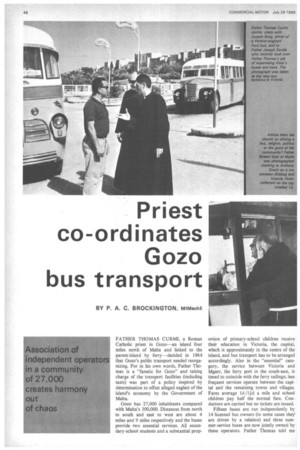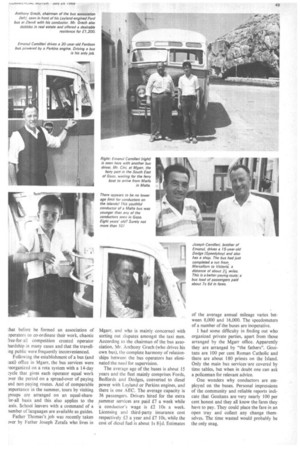Priest co-ordinates Gozo bus transport
Page 50

Page 51

If you've noticed an error in this article please click here to report it so we can fix it.
BY P. A. C. BROCKINGTON, MINlechE
FATHER THOMAS CURMI, a Roman Catholic priest in Gozo—an island four miles north of Malta and linked to the parent islandby ferry—decided in 1964 that Gozo's public transport needed reorganizing. For in his own words, Father Thomas is a "fanatic for Gozo" and taking charge of the transport facilities (including taxis) was part of a policy inspired by determination to offset alleged neglect of the island's economy by the Government of Malta.
Gozo has 27,000 inhabitants compared with Malta's 300,000. Distances from north to south and east to west are about 4 miles and 9 miles respectively and the buses provide two essential services. All secondary-school students and a substantial prop
ortion of primary-school .children receive their education in Victoria, the capital, which is approximately in the centre of the island, and bus transport has to be arranged accordingly. Also in the "essential" category, the service between Victoria and Mgarr, the ferry port in the south-east, is timed to coincide with the ferry sailings; less frequent services operate between the capital and the remaining towns and villages. Fares average ld/l+d a mile and school children pay half the normal fare. Conductors are carried but no tickets are issued.
Fifteen buses are run independently by 14 licensed bus owners (in some cases they are driven by a relation) and three summer-service buses are now jointly owned by these operators. Father Thomas told me that before he formed an association of operators to co-ordinate their work, chaotic free-for-all competition created operator hardship in many cases and that the travelling public were frequently inconvenienced.
Following the establishment of a bus (and taxi) office in Mgarr, the bus services were reorganized on a rota system with a 14-day ycle that gives each operator equal work aver the period on a spread-over of paying and non-paying routes. And of comparable importance in the summer, tours by visiting groups are arranged on an equal-share'or-all basis and this also applies to the :axis. School leavers with a command of a number of languages are available as guides.
Father Thomas's job was recently taken aver by Father Joseph Zerafa who lives in Mgarr, and who is mainly concerned with sorting out disputes amongst the taxi men. According to the chairman of the bus association, Mr. Anthony Grech (who drives his own bus), the complete harmony of relationships between the bus operators has eliminated the need for supervision.
The average age of the buses is about 15 years and the fleet mainly comprises Fords, Bedfords and Dodges, converted to diesel power with Leyland or Perkins engines, and there is one AEC. The average capacity is 36 passengers. Drivers hired for the extra summer services are paid £7 a week while 'a conductor's wage is £2 lOs a week. Licensing and third-party insurance cost respectively £3 a year and £7 10s, while the cost of diesel fuel is about Is 8-4d. Estimates of the average annual mileage varies between 8,000 and 16,000. The speedometers of a number of the buses are inoperative.
I had some difficulty in finding out who organized private parties, apart from those arranged by the Mgarr office. Apparently they are arranged by "the fathers". Gozitans are 100 per cent Roman Catholic and there are about 180 priests on the Island. Only the main bus services 'are covered by time tables, but when in doubt one can ask a policeman for relevant advice.
One wonders why conductors are employed on the buses. Personal impressions of the community and reliable reports indicate that Gozitans are very nearly I00 per cent honest and they all know the fares they have to pay. They could place the fare in an open tray and collect any change themselves. The time wasted would probably be the only snag.












































































































